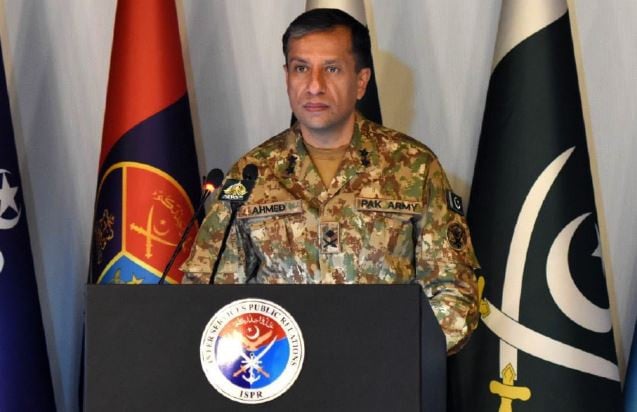By Staff Reporter
RAWALPINDI: The Pakistan Army has initiated court-martial proceedings against former spymaster Lieutenant General (Retd) Faiz Hameed after a detailed inquiry found concrete evidence of multiple violations of the Army Act, the military’s spokesperson said on Thursday.
Inter-Services Public Relations (ISPR) Director General Lieutenant General Ahmed Sharif Chaudhry told a press conference that the army had found Hameed, who was arrested last month, to be involved in “several instances of violation of the Army Act”, following which court martial proceedings had been initiated.
“Following a detailed inquiry based on concrete evidence, the Pakistan Army announced on August 12, 2024, that the relevant officer had violated sections of the Army Act.”
Hameed, widely believed to be close to jailed former Prime Minister Imran Khan, faces charges of violating the Army Act. His arrest and court-martial proceedings have shattered the long-held perception that spy chiefs were untouchable in Pakistan, where generals have long wielded unparalleled influence.
Chaudhry said the military believes in the process of self-accountability, “and the process of self-accountability that the army follows is extremely comprehensive, transparent, and time-tested”.
“This process of self-accountability works on solid proof and evidence instead of allegations,” Chaudhry said. “This self-accountability system comes into effect speedily without any discrimination whenever there is a violation of army laws and regulations.”
“Whenever there is a violation of the established laws and rules within the army, this robust process of self-accountability speedily comes into effect without any discrimination.”
The military at the time of Hameed arrest on the charges relating to a land development case, also said “multiple instances” of violation of the Pakistan Army Act post-retirement had been found against him, in what was widely seen as a veiled reference to his support for Khan and his party, including in planning the May 9 riots of last year after a brief arrest of Khan in land graft case. khan’s supporters and Pakistan Tehreek-e-Insaf (PTI) party attacked and damaged government and military installations.
Chaudhry said the accusation is there on the retired officer that he crossed legal and constitutional bounds on the instruction of particular political elements for his personal interest.
“The case against Gen (Retd) Faiz Hameed testifies that the Pakistan Army takes violations carried out for personal and political purposes very seriously and takes immediate action, without discrimination, according to the law. We hope that such non-discriminatory self-accountability also persuades other institutions,” the spokesman said.
“It is important to know that if any person in the army works for personal interest or forwards a specific political agenda for personal benefit then the army’s process of self-accountability kicks into action. There is a clear consensus within the army that it is a national, state-owned institution, which will be prevented from being used for the completion of goals related to specific political agendas.”
The army spokesman said that all of them were entitled to their rights as per the law, such as appointing a lawyer of their choice and the right to appeal.
Balochistan
The military blamed “internal and external enemies” for a series of deadly terror attacks in Balochistan last month, saying they aimed to disrupt peace and development in the region.
Separatist militants killed over 50 people in the country’s largest province in a string of coordinated attacks on army and paramilitary camps, police stations, railway lines and highways on the night of Aug. 25-26.
“The attacks were carried out on the directives of internal and external enemies and their enablers,” Chaudhry said.
He added that the aim was to impact Balochistan’s peaceful environment and development by targeting innocent people.
“We know that a sense of deprivation and state force is also found among the people of Balochistan, which certain elements exploit on external directives,” the spokesman said.
“These acts were conducted with the assistance of internal and external enemies and their facilitators. The aim was to hurt the peace of Balochistan and its development by targeting innocent civilians.”
Chaudhry emphasized that those carrying out the attacks and ordering them “had no connection with Islam, humanity, Baloch tradition or actions”.
Pakistan has previously accused India and Afghanistan of supporting separatist militants in Balochistan, a charge denied by both countries. Ethnic Baloch militants say they are fighting for secession due to what they see as the unfair exploitation of the province’s mineral and gas wealth by the federation.
Copyright © 2021 Independent Pakistan | All rights reserved




